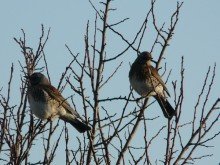March started with county (and the whole country) in the grip of the ‘beast from the east!’. Most of Britain had an extensive covering of snow and even down here in the soft south conditions were pretty dire for a couple of days. This not only wrought havoc with the human population but threw many ground feeding birds into panic as they tried to escape the sever conditions by flying further south. For many that came south to Dorset there was bad news, it was not good here either and the only option was to head out to sea. Flocks of thousands of birds were seen flying along the Dorset coast heading west in the hope of finding feeding areas rather than actually venture out in to the unknown.
Small flocks of golden plover can be seen in Dorset every winter but for a few days during the ‘beast’ they were seen along the coast everywhere and in huge numbers, all victims of the of the desperate loss of feeding opportunities at a time when they actually needed extra food. Lapwing also feed in damp fields in winter and their numbers too reached four figure flocks as they were caught in the same trap set by the weather conditions. Fieldfare and redwing are more often seen here down south but again, the numbers during the ‘beast’ were far higher than we would normally expect.
The most significant single bird to be affected was a Ross’s gull. This is a species from the Arctic region and rarely seen away from the Siberian and Canadian north even in winter but one arrived in Weymouth just ahead of the ‘beast’, presumably brought here by the strong easterly wind. It soon developed a routine of spending the night at Ferrybridge (near the Portland Causeway) then moving on to Weymouth Bay. It then spent some time at Radipole, often in the company of the other gulls that line up in the car park there at high tide. From there it would move on to Lodmoor and then out in to the bay again before heading back ‘home’ to Ferrybridge. Being very rare in this country it drew crowds from all over although there were some very disappointed people who set out and could not get down to Dorset due to the dreadful road conditions. It stayed for about a week and then flew off out to sea one day and was never seen here again.
Once the ‘beast’ had gone there was brief sign that the spring migration was under way with reports of wheatear, chiffchaff and sand martins coming in off the sea for a couple of days and then we slid back in to the ‘mini-beast’ with some more snow and the migration news has been pretty sparse since then.
In the few days that were a little spring-like adders have been seen basking in the weak sunshine and a few butterflies, mainly brimstone, emerged. Some enthusiastic ‘moth trappers’ had some early spring moths to identify but nothing too extraordinary. Reports of bloody-nosed beetle, green tiger beetle and oil beetle again gave encouragement that spring really is due here soon!
Off shore the number of sea birds has been declining although two red-necked grebes in Weymouth bay seem reluctant to head back north but the main feature has been a pod of bottle-nose dolphin, possibly 12 animals in all, performing well and seen leaping out of the water off Portland Bill in the ‘races’. They were also seen as far east as Durlston.
So, as we await the arrival of April we also await the arrival of the spring migrants. A swallow was seen towards the end of the month but that is not going to make a summer is it?
You can find out more about the nature of Dorset in March 2018 here: https://www.natureofdorset.org.uk/records-diary/march-2018
Peter Orchard







